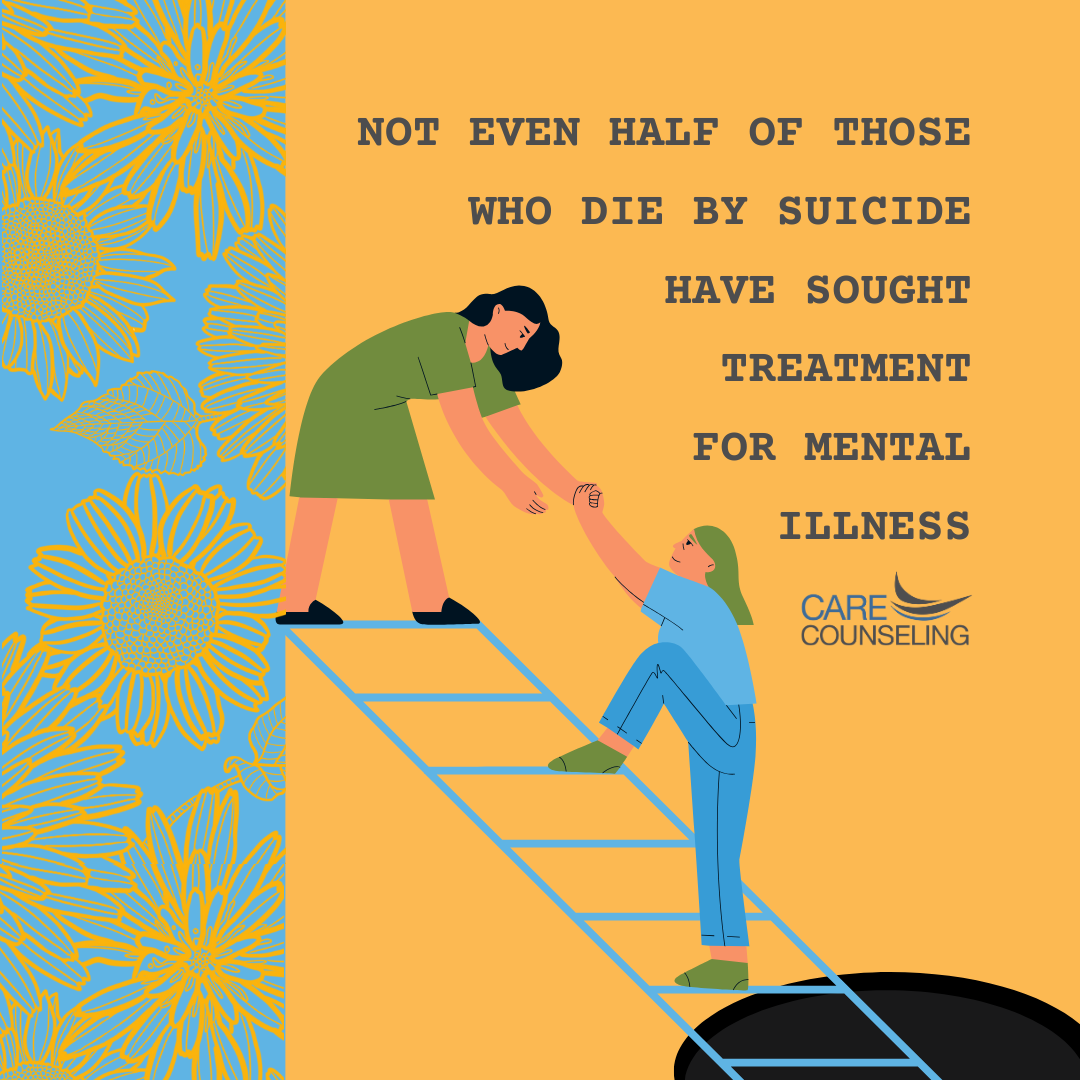It’s alarming that not even half of those who die by suicide have sought treatment for mental illness.

According to a systematic review of peer-reviewed articles, less than half of the people who die by suicide have seen a mental health professional. Over half (55.3%) of those who died by suicide had current mental health problems but less than half (48.5%) had any history of treatment for mental illness.
The Minnesota Violent Death Reporting System (MNVDRS) gathers information to learn more about people who die by violence, including suicide. Populations consistently associated with not receiving mental health services included younger and older individuals identified as male and those living in rural locations. Black, Indigenous, and people of color (BIPOC) and individuals experiencing psychosocial stressors may also be less likely to receive mental health services. Individuals who have never sought therapy are less likely to have a mental health diagnosis or any connections to receiving mental health support.
It is frightening that those who have not sought treatment for mental health are more likely to use violent means to commit suicide. The top three means of suicide deaths include firearms, hanging, strangulation/ suffocation, and poisoning. While violent means are common, so is the use of substances, including prescription and non-prescription medications. Data indicates that 31% of suicides involve the use of alcohol, 15.8 % involve the use of antidepressants, and 6-10% of deaths involve one or more of the following: benzodiazepines, amphetamine, marijuana, and opiates. There may be no indication of any past suicidal behavior, so suicide may come as a shock to loved ones.
It is important to help support people who are at risk of suicide. One way we can do this is by understanding the needs of those who are underserved and developing new ways of responding to these needs and continuing to improve existing mental health services. It is also important to help yourself. If you are struggling with suicidal thoughts, the Suicide and Crisis Lifeline identifies serval ways to help yourself including finding a therapist, building (and using) a support network, and making a safety plan.
At CARE Counseling, therapists are trained to assess safety at the first session and assist in creating a safety plan for those who are struggling but able to create and follow a safety plan. Therapists are also trained to diagnose and treat mental health concerns. Therapists can help assist in connection to more intensive care if needed. Here are some additional ways a therapist can help with suicidal thoughts:
A therapist can help you identify your warning signs. These include thoughts, images, moods, situations, and behaviors that are present during a time of crisis.
A therapist can help you develop internal coping strategies. These are things that you can do on your own to help take your mind off problems. Examples include relaxation techniques, self-soothing strategies, and physical outlets.
A therapist can help build your support and get you connected. A therapist can help you talk through possible supporters who are part of your existing support network. This may include a friend, family member, or co-worker. Perhaps you are feeling isolated and alone–struggling to name anyone that you could reach out to. That is OK! We’ll help get you connected to phone numbers of professional helpers, such as the resources listed below.
National Suicide Prevention Lifeline: 988; https://988lifeline.org/
In the case of imminent harm, call 911.
Mental Health Crisis Services: Call: **CRISIS or Text: MN to 741741
Metro Area Mental Health Crisis Response:
Ramsey (adults): (651) 266-7900 & Ramsey (children): (651) 774-7000
Hennepin (adults): (612) 596-1223 &Hennepin (children): (612) 348-2233
South Central Mobile Crisis Team: (877) 399-3040
Minnesota Farm & Rural Helpline: Call: (833) 600-2670 or Text: FARMSTRESS to 898211
The Trevor Project: (866) 488-7386; https://www.thetrevorproject.org/
A therapist can with skills & strategies to feel safe within your environment.This can start with taking steps of being physically safe by removing access to means such as firearms, drugs, and alcohol. Working on ways to feel emotionally safe by processing psychosocial stressors and learning strategies to cope can also help.
No one needs to suffer alone. While asking for mental health support can feel scary, it can also be a tremendous support that offers hope.
Written By: Charlotte Johnson, MA, LPCC
We’re Here to help
Our wellness experts will be happy to take care of you. You can CLICK HERE to schedule an appointment now or call (612)223-8898.
Meet Clinicians
We’re united by our commitment to providing effective, relevant, and innovative mental health support at all stages of your journey. Click Here to find a therapist or find out more about who we are, where we come from, and how we live out CARE’s mission every day.
The professionals at CARE are actively collecting and creating resources to help with what you need and address frequently asked questions. We’re Here for You.



